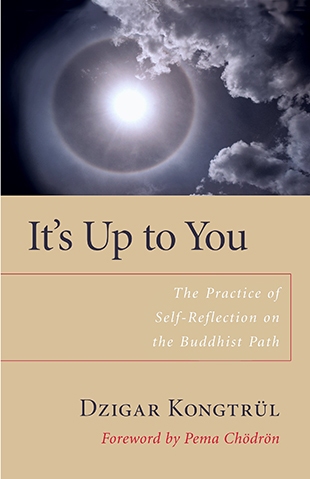Dzigar Kongtrul was born in northern India, the son of a highly respected Buddhist teacher. After being recognized as an incarnation of Jamgon Kongtrul Lodro Thaye, he received extensive traditional training in all aspects of Tibetan Buddhist doctrine. In 1990, he began a five-year tenure as a professor of Buddhist philosophy at Naropa University in Boulder, Colorado. He founded his own teaching organization and then established a mountain retreat center, Longchen Jigme Samten Ling. The essays in this volume are based on Kongtrul's weekly "personal link" teachings. He believes that self-reflection is the common thread that runs through all Buddhist traditions and brings a maturity to the serious student of meditation.
The main obstacle is self-importance:
"When we look into the mirror, the one thing we don't want to see is an ordinary human being. We would like to see someone special. Whether we are conscious of this or not, we are simply not content to see an ordinary human being with neuroses, obstacles, and problems. . . We are imprisoned in this pain by a sense of specialness, or self-importance. Self-importance is the underlying clinging we have to 'I, I, I, me, me, mine, mine,' which colors all of our experience. If we look closely, we find a strong element of self-importance in everything we think, say, and do. 'How can I feel good? What will others think? What will I gain? What will I lose?' These questions are all rooted in our self-importance. Even our feeling of not measuring up to who we think we should be is a form of self-importance."
Through the practice of self-reflection, we can move beyond this prison and engage in the process of watching our thoughts and emotions arising and falling in our minds. Throughout this helpful book, Kongtrul enables us to sense the workings of the mind and let things be rather than trying to control everything.
In one of the many enlightening passages, the author reveals the meaning of wealth:
"Richness and meaning don't lie outside of us. And life is not just about 'what can I get?' or 'what don't I have?' When we open up to the richness of experience, we are less fearful and more able to enjoy life to the fullest. We appreciate the beauty of our world and everything we encounter. With this unrestricted mind of richness, even a beggar on the street can feel like a universal monarch. To the extent that we recognize our inner richness, we will have a tremendous sense of security that we can trust in any situation. Knowing that we can depend on ourself brings contentment and joy. Whatever arises in our life — good or bad, comfortable or uncomfortable — is enjoyable. I hope that every one of us can at least glimpse this experience. Then we won't get so stuck in the hardships of our pick-and-choose world."
It is insights such as these that have made Pema Chodron an ardent student of Dzigar Kongtrul. After reading It's Up to You, you will feel the same way — eager to be exposed to more of his teachings.
